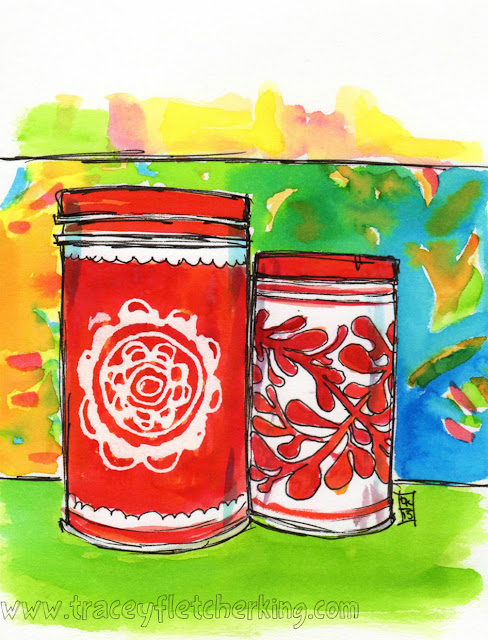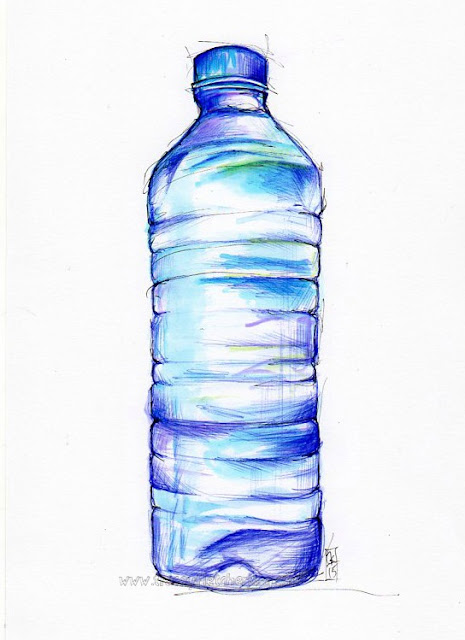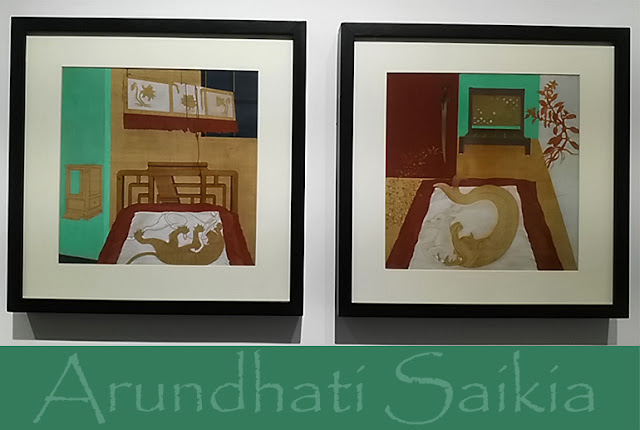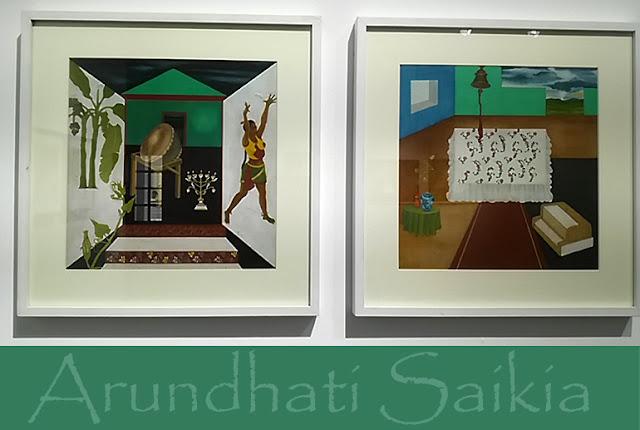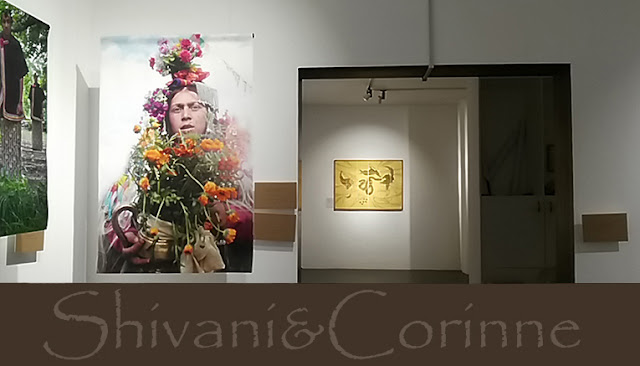An
artist, illustrator and teacher, Tracey Fletcher King from Queensland, breathes life into all things simple, small, ordinary and omnipresent offering them a new lease of life!
One would never imagine they could be so beautiful unless one sees it through
Tracey’s eyes! Her ability to turn even a regular kitchen gadget or a bottle of
mineral water into a piece of art has what has always amused me. Each week I
could see a household item turned into gorgeous art. So here’s Tracey Fletcher
King for you my lovely readers…
Tracey Fletcher King
Deepa: Tell us something about yourself…your
family, background, education etc.
Tracey: I am a painter, illustrator and
teacher and have been creative in some form or another for as long as I can
remember. I studied art and education at university and went on to teach art in
schools teaching all ages, from 4 year olds through to some teaching at
university level. I hold post graduate qualifications in curriculum and have a
Masters degree specializing in creativity theory and over the years have taught
workshops and exhibited my art in galleries and through different art groups I
have been a part of. Now I mainly work as an illustrator, though I also sell my
paintings, prints and cards of my work and I teach online, not to mention
blogging, which I love a huge amount as it is the thing that brings all the
creative parts of my life together somehow.
Deepa: How
did your journey as an artist begin? Who is your inspiration? Who taught or
inspired you to indulge in art?
Tracey: I have always been creative and
my favourite present growing up was a set of crayons which had a million
colours and came from my uncle who is an architect and designer. He is a
constant inspiration, as is my father who paints in oils, my aunt who is a
photographer and writer, I had a grandfather who wrote in his spare time, and a
lot of amazing teachers and people who have influenced me and guided meaning
the way. I find that I am inspired by so many people and things that it is a
bit embarrassing. It is like I see the world in terms of painting and it is
hard to turn that off sometimes and I am lucky that through blogging I have
found people who understand creativity and the thought processes that go with
it.
Deepa: From what I gather, you indulge in watercolours the most…Does that make it your favourite medium?
Tracey: I love drawing more than anything. It drives everything I do and I have
sketchbooks that I work in constantly that are just for me and that I don't
share. The work I do share tends to be in ink and watercolour as it is a medium
that lends itself to working with drawing well and it is so unpredictable,
which I love. I really like that it can go horribly wrong and that I can't
control it because that means lots of fun things can happen. When I was
studying creativity theory I realized that I had been taking the wrong approach
and trying to learn it all and control it, and now I try to push things and
enjoy not mastering things. It has freed me up so much and made the whole
process fun instead of stressful.
Deepa: The work that you do in your sketchbooks that you don’t share, as you mentioned above…are they different from your usual works (that we all distinguish as ‘Tracey Fletcher King Works’’)?
Tracey: They are different and are a lot more experimental and include a lot of notes and writing as well. They are a continuation of sketchbooks I have kept since I was at university studying art 30 years ago. They are more working books and a place for me to record ideas and work out thoughts and processes, as well as to record what I am thinking about etc. For example during my treatment for cancer they were invaluable and had a lot of drawings of medication, IV stands, medical machines etc and were quite dark and lots of greys and blacks rather than my usual bright colours, plus they had lots of writing and I recorded a lot of my fears and worries. They reflected how difficult that time was and it helped enormously, but I would never feel comfortable sharing them and in fact they can be hard to look back on now. It is invaluable to have a private creative space that you never have to worry about making mistakes, or over sharing, where you can just try things and do whatever you like.
Deepa: Your subjects are everyday objects which are unique in itself for being simplistic…which is quite interesting to be seen in a different light…what is your motivation behind such themes and how do you decide your subjects?
Tracey: I like to draw from things around me because I like to illustrate my
life and things that interest me. I know the objects intimately and they have
meaning to me so they work on a different level. I like to find the interesting
things in my immediate environment because it helps me to be more aware of what
is there. To be more present in a way and not just look for things that are
worth recording, that is important. I don't believe in editing an object's
worthiness to be painted. If it exists it can be drawn and painted and it means
you never run out of things to paint. It is endless and it makes you more aware
of your environment. A trip to the grocery shop can be inspiring; putting away
my daughter's toys when she was small may made me stop and look at a toy as a
possibility, or a flower I see on a walk. The whole day becomes one long
creative possibility.
Deepa: Are you in any way influenced by artists’ like Andy Warhol (for recreating omni present objects)?
Tracey: I am not very influenced by other artists like Warhol. I love reading
about contemporary artists and still read art theory regularly, but my work is
just my work. I try to record my day visually and see what grabs my attention.
I love going to our galleries, and visit regularly, and have several artists
that I really love, not to mention I have a collection of art books and artist
biographies that I read often, but it is more about immersing myself in the
things that interest me, rather than them influencing me directly. I just like
anything art, illustration or design related really. It is as simple as that.
Tracey: I
am fairly new to online teaching and it has been a very steep learning curve.
The planning is the same as teaching in person, but the filming was a challenge
at first as I am not great with technology, but I am getting better at that,
and I actually enjoy the experience now. The actual teaching is surprisingly
similar in a lot of ways, though the different time zones can present a
challenge. The biggest challenge has been teaching student for whom English is
a second language, and in one case a student spoke no English so we
communicated via google translate which led to some very odd conversations
thanks to dodgy translating. It all worked out and she created amazing work,
but some of the translations were hilarious.
Tracey: I am not great at the
business side as I tend to lose interest a bit at times. I am in the middle of
setting up on online store to streamline the online processes. As it stands I
will sell prints and cards etc when people enquire, but I have never set up an
actual online store. I have usually sold a lot in person through galleries and
artists collectives, and have struggled to keep up with demand so have never
pursued the online stores very much, but I am getting my act together and going
down that road as well now. I find it easier to be organised and more
business-like in my approach to my illustration work and am a lot more
organised in my approach. I think that is because the illustration side has
started a lot later and I learnt a lot from my experiences selling my art. I am
trying to get them both working the same at the moment but it is a struggle to
find the time sometimes. I would rather be painting and that is why I think so
many online creative aren’t great at business. We usually have things we would
rather do, like draw or paint!
Deepa: “…I realised that I had been
taking the wrong approach and trying to learn it all and control it, and now I
try to push things and enjoy not mastering things. It has freed me up so much
and made the whole process fun instead of stressful.”
(I think even I have that tendency to control things so do many other
artists’ who are yet to free themselves up!)
Would you like to enlighten us on how you achieved that?
Tracey: I spent a lot of time telling myself that I needed to understand all the
processes, and the details before I could say that I was good at something. I
looked for solutions instead of giving things a go myself first. The internet
is a blessing and a distraction as it is easy to look up how to do something
instead of giving it a go yourself. There are so many experts online and you
can start to doubt yourself and get confused. I made a conscious decision to
not worry about details and get caught up in details and have a go and see what
happens. My perfume bottles and the bleeding colours came out of an accident
and I love that effect now, and if I was sticking to the rules of watercolour,
and being uptight I would never have played with it. So it is about setting
aside time to play and try things and to accept mistakes. Look at them and ask
yourself what you can turn it into… work with whatever happens. Sometimes it
works out beautifully, and others it is a disaster, but most of the time it
works beautifully!
Deepa: I
had seen images of the Cuppa Project and it was quite fascinating. Can you
share what that project was about and what was your experience like?
Tracey: In 2013 I started a
project called The Cuppa With Friends Project which involves people sending me
photos of their teacups and mugs and I draw and paint them. I was doing one
every day when I was diagnosed with advanced breast cancer and it was impossible
to keep that up as I underwent aggressive treatment for the next year, but
every now and again I would revisit the project and do some more. It has taken
me a while to get back into it fairly regularly, and I enjoy the challenge of
creating different artworks on a small scale in a limited amount of time. I set
a limit of 30 mins to spend on them so I don’t get too caught up. It is a great
warm up, or wind down activity in the studio, and I love getting new ones to
add to the pile so I always have one that inspires me when I flick through
looking for one to paint. At last count I had completed 69 of them and I work
on them when I can squeeze them into my schedule. I love the challenge of
different mugs and cups and enjoy the stories that people send me telling me
why they are special to them… it really does feel like I am having a cup of tea
or coffee and connecting with them through painting their mugs and cups. I have
people send me mugs and cups regularly and if you would like to be part of the
project then email me a photo of a mug or cup that you love. T doesn’t have to
be fancy, or special, just one you like… the page with more information
can be found at http://www.traceyfletcherking.com/p/cuppa-with-friends-project.html and you can email photos
to tki46582@bigpond.net.au
Deepa: Do
you attend/conduct live workshops? How is it different from online ones? Which
needs more preparation? How does it enhance you as an artist?
Tracey: Online
workshops need more preparation as you have to think ahead to try to anticipate
what problems and questions might ask, whereas in a live class you can answer
and adapt the class as they ask questions. I can draw on my vast experience in
teaching, education and the many years at university studying art and so it is
quite natural to adapt as I go. Without that experience and all the years of
study into art curriculum and creativity theory that would be much harder. Both take their toll on your artwork as they
are time consuming to both prepare and then conduct. It is good to make sure
there are spaces between doing them so you have time to get back into the
groove of your own work.
Deepa: Which
book is your “Bible” as far as art is concerned? Who are you favourite
artist(s’)? Whose works can be seen hanging in your living room?
Tracey: I
have several art manual type books, though I don’t often look at them. I
wouldn’t say that I have a bible to tell you the truth. There are some artists
that I like very much. I love Australian artists Ben Quilty, William Robinson, John
Olsen and Del Kathryn Barton. They are all very different but I love them all
the same. I have several different works on my walls. I own several by and
artist called Jack Oudyn who I adore, and Leigh Camilleri, as well as fellow
artists I have met online such as Marjorie Thompson, Kristin Dudish, Sandra
Busby, Yvonne Kennedy, Denise Allan and Nic Mclean to just name a few.
Deepa: Have
you ever visited India? Have you come across Indian art/artists’? Any personal likes
or favourites?
Tracey: I
haven’t visited India, though my husband has and he loved it. I am not very
familiar with Indian art, though there are several bloggers who I have enjoyed
meeting immensely, and is one of the reasons I really enjoy your blog as it is
introducing me to so many amazing artists and the culture and architecture…
love the sense of colour I see coming through more than anything though.
Tracey: My best advice is to
not get caught up in creating finished products all the time. Some of the
things you draw and paint should be fun, or for play. We get bombarded by
finished work as most people like to share the things they are proud of, and we
don’t get to see the piles of work that was discarded for whatever reason.
Sometimes it is great fun to forget about all of that so you can see what risks
you are willing to take if you don’t have that pressure of sharing all of your
work.
https://www.facebook.com/tracey.f.king
https://plus.google.com/u/0/102291963626375685770/about
I
would like to thank Tracey from the bottom of my heart for having done this
interview even when she was on vacation and spending her days with family.
Thank you so much Tracey…May Almighty shower you all the health and happiness and wishing you the very best in all your future endeavours.
Dear
Friends, Hope you enjoyed reading about Tracey as much as I enjoyed putting it
together for you…
Thank you for dropping by and leaving your words of
encouragement, support and love as always. :)
please do not use the copyright images/content without the written consent of the artist/author.




